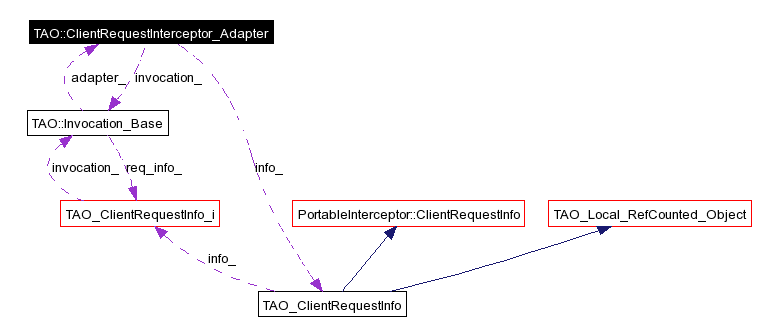
#include <ClientRequestInterceptor_Adapter.h>
Collaboration diagram for TAO::ClientRequestInterceptor_Adapter:

Public Member Functions | |
| ClientRequestInterceptor_Adapter (ClientRequestInterceptor_List::TYPE &interceptors, Invocation_Base *invocation) | |
| ~ClientRequestInterceptor_Adapter (void) | |
PortableInterceptor Client Side Interception Points | |
Each of these methods corresponds to a client side interception point. There are no "intermediate" interception points on the client side, only "starting" and "ending" interception points. | |
| void | send_request (TAO_ClientRequestInfo_i *ri ACE_ENV_ARG_DECL) |
| void | receive_reply (TAO_ClientRequestInfo_i *ri ACE_ENV_ARG_DECL) |
| void | receive_exception (TAO_ClientRequestInfo_i *ri ACE_ENV_ARG_DECL) |
| void | receive_other (TAO_ClientRequestInfo_i *ri ACE_ENV_ARG_DECL) |
Protected Member Functions | |
| void | process_forward_request (TAO_ClientRequestInfo_i *ri, PortableInterceptor::ForwardRequest &exc ACE_ENV_ARG_DECL) |
Private Attributes | |
| ClientRequestInterceptor_List::TYPE & | interceptors_ |
| Reference to the list of registered interceptors. | |
| Invocation_Base * | invocation_ |
| Pointer to the GIOP invocation object for the current request. | |
| const size_t | len_ |
| size_t | stack_size_ |
| TAO_ClientRequestInfo * | info_ |
This class invokes all registered interceptors at interception point, and enforces flow rules dictated by the Portable Interceptor specification/chapter.
|
||||||||||||
|
|
|
|
|
|
||||||||||||
|
Process the given PortableInterceptor::ForwardRequest exception, i.e. invoke the receive_other() interception point, in addition to notifying the Invocation object of the LOCATION_FORWARD. |
|
|
This method implements one of the "ending" client side interception point. |
|
|
This method implements one of the "ending" client side interception point. |
|
|
This method implements one of the "ending" client side interception point. |
|
|
This method implements one of the "starting" client side interception points. |
|
|
|
|
|
Reference to the list of registered interceptors.
|
|
|
Pointer to the GIOP invocation object for the current request.
|
|
|
Cache the length of the interceptor list so that we don't have to compute it at each stage of the current interception. |
|
|
The number of interceptors "pushed" onto the logical flow stack. This is used when unwinding the flow stack. |
 1.3.9.1
1.3.9.1